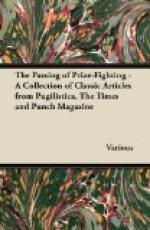I had been at home about a week when his first communication arrived—an unexpected windfall purporting to represent the balance of my pay and allowances. The method of computation would probably have transcended my intelligence if it had been indicated; but there was no attempt at explanation, nor did I desire it. I stamped and signed the receipt form according to unmistakable directions, and returned it to Headquarters. A few days later certain arrears of Separation Allowance came to hand—arrears whose existence our own unaided sagacity would never have revealed. Guided by an illustrative diagram we signed the receipt in due form and returned it. Before we had ceased congratulating ourselves on these accessions, yet another instalment of pay was delivered, with form of receipt as in the previous case. We were almost convinced that the country cottage and the leisured ease of our dreams were within our grasp, but the well ran dry at that point. Some of my balance may yet lurk in the coffers of the Paymaster, but I dare not throw off the yoke of my bondage on the strength of a bare possibility.
After a brief interval, Records returned to the charge with a bulky envelope containing matter of great interest. One of the enclosures certified that, for the term of three months, I was transferred to Class W.P., Army Reserve. I made various conjectures as to the meaning of “W,” and so did Cinderella. On the whole we favoured “Warrior,” but perhaps we were wrong. At all events, the interpretation of “P” was clearly set forth by another document, which explained that I was entitled to a pension of eight shillings and threepence per week so long as I remained among the happy W.P.’s. There was also an identity certificate, whereon some clergyman, magistrate or policeman must attest that I was alive when I brought it to him, and a form of receipt for all the papers in the batch. I signed it according to instructions and returned it to Headquarters.
The identity certificate went back to a specified address, where it set in motion machinery by which my pension paper was presently delivered to me—accompanied by a form of receipt. This paper was covered with mystic circles, whose meaning I discovered when I presented myself at the post-office. They were apparently intended to appease the presiding divinity by gratifying her passion for stamping things. She hit my paper accurately in four of its rings, and then, with a pleased smile, handed me thirty-three shillings.
Meanwhile Records had stirred up a benevolent neighbour to call upon me. He belonged to an organisation for assisting discharged soldiers; he was Opportunity in person for anyone who might need him; but, as Cinderella explained, I was at that moment engaged upon work of national importance and could not claim his help. Nevertheless she thanked the gentleman and placed the incident to the credit of the Powers That Be.
No acknowledgment was required for this visit; but a week later my war services’ badge was delivered per registered post, and I confessed the fact both on the usual green slip and on the form of receipt which was enclosed. Henceforth I was able to appear in public with an outward and visible sign of the ferocity which underlies my demeanour, and my most lurid tales had a substantial witness.




